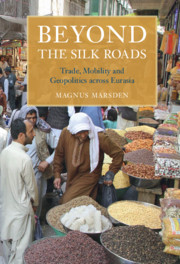Book contents
- Beyond the Silk Roads
- Asian Connections
- Beyond the Silk Roads
- Copyright page
- Dedication
- Contents
- Maps
- Acknowledgements
- Glossary
- Maps
- Introduction: Beyond the Silk Roads
- 1 ‘Take Your Help Away and Leave Us in Peace!’
- 2 Inter-Asian Corridor of Connectivity (1): The Eurasian World – China, Russia, Ukraine and Western Europe
- 3 Inter-Asian Corridor of Connectivity (2): West Asia – China, the Arabian Peninsula and Turkey
- 4 ‘Welcome to Yiwu, China International Trade City!’ Everyday Life in a Chinese Commercial Node
- 5 Minorities, Commerce and the Legacy of Muslim Asia’s Urban Cosmopolitanism: Afghanistan’s Hindus and Sikhs
- 6 An Alternative Eurasian Economic Geography: Afghanistan’s Role in Long-Distance Trade
- 7 Afghan Restaurants in Inter-Asian Worlds: Prestige, Information Pooling and Cross-Cultural Exchange in Long-Distance Trade
- Conclusion: Geopolitics, Critical Responsiveness and Navigational Agency in Eurasian Connectivity
- Note on Fieldwork
- References
- Index
- ASIAN CONNECTIONS
Index
Published online by Cambridge University Press: 31 August 2021
- Beyond the Silk Roads
- Asian Connections
- Beyond the Silk Roads
- Copyright page
- Dedication
- Contents
- Maps
- Acknowledgements
- Glossary
- Maps
- Introduction: Beyond the Silk Roads
- 1 ‘Take Your Help Away and Leave Us in Peace!’
- 2 Inter-Asian Corridor of Connectivity (1): The Eurasian World – China, Russia, Ukraine and Western Europe
- 3 Inter-Asian Corridor of Connectivity (2): West Asia – China, the Arabian Peninsula and Turkey
- 4 ‘Welcome to Yiwu, China International Trade City!’ Everyday Life in a Chinese Commercial Node
- 5 Minorities, Commerce and the Legacy of Muslim Asia’s Urban Cosmopolitanism: Afghanistan’s Hindus and Sikhs
- 6 An Alternative Eurasian Economic Geography: Afghanistan’s Role in Long-Distance Trade
- 7 Afghan Restaurants in Inter-Asian Worlds: Prestige, Information Pooling and Cross-Cultural Exchange in Long-Distance Trade
- Conclusion: Geopolitics, Critical Responsiveness and Navigational Agency in Eurasian Connectivity
- Note on Fieldwork
- References
- Index
- ASIAN CONNECTIONS
Summary
- Type
- Chapter
- Information
- Beyond the Silk RoadsTrade, Mobility and Geopolitics across Eurasia, pp. 289 - 301Publisher: Cambridge University PressPrint publication year: 2021
- Creative Commons
- This content is Open Access and distributed under the terms of the Creative Commons Attribution licence CC-BY-NC-ND 4.0 https://creativecommons.org/cclicenses/



